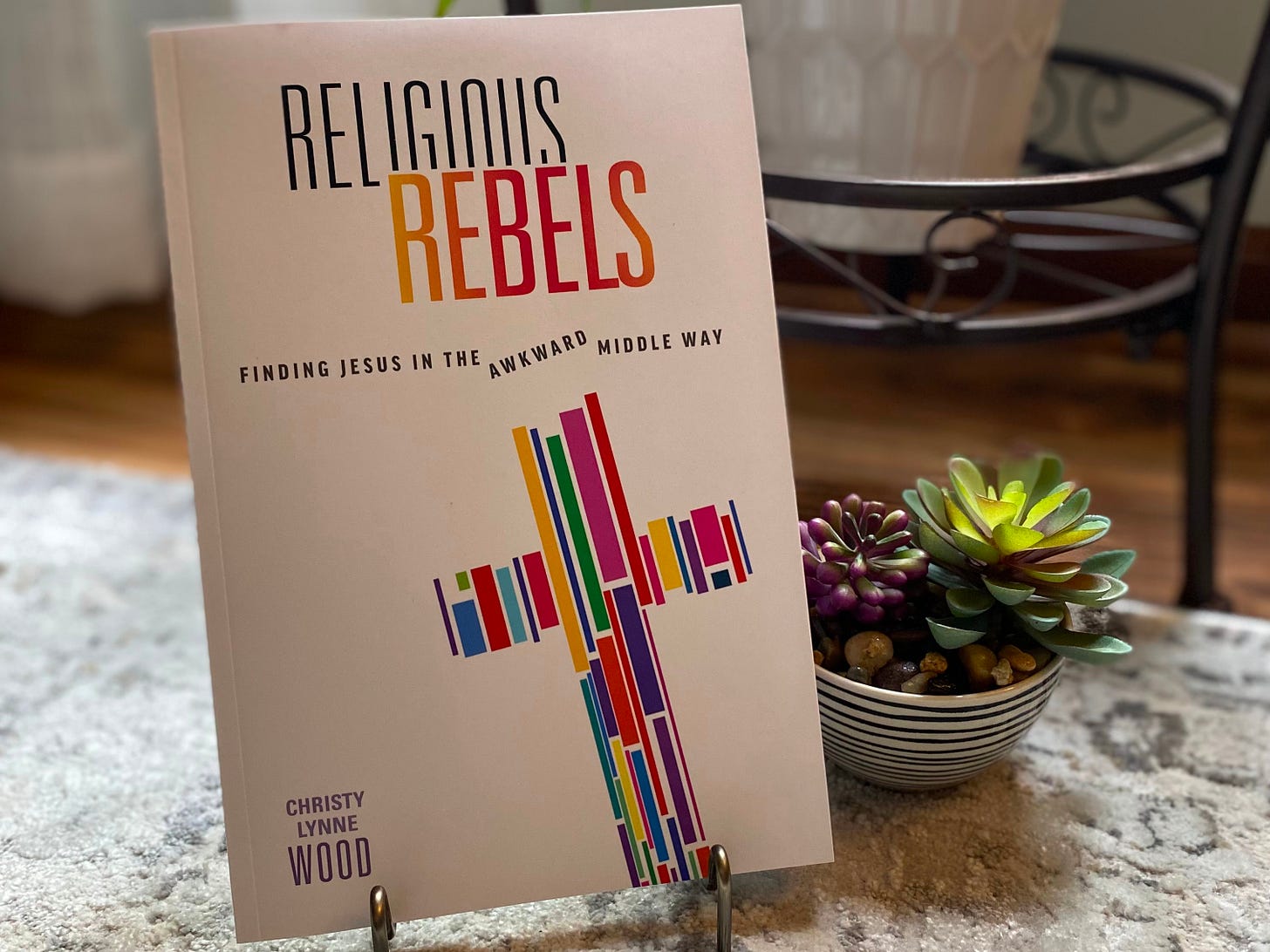
“If you run out into a summer rainstorm, no one has to tell you to get wet. You get soaked because you are in the rain.” ~ Me on Threads
Discussions about forcing the Bible to be taught in public schools are just one area where my old life seems to be colliding with my new one. Christian nationalism is a buzz word these days. It’s trippy to me and feels a bit like a multiverse timeline branch gone wrong. How did I escape my cult days only to see ideas from my cult go mainstream? How did moralistic Christianity, with it’s fixation on moral codes and behavior, slide in without being noticed?
This essay started with a comment
made about the “poverty of evangelicalism.” I’d already been questioning what was behind Christian moralism and when I heard the word poverty, I instantly thought of emptiness. What if the root of Christian moralism is an empty gospel that has to force people to behave and change?The poverty of evangelicalism is a topic that feels a bit awkward for me since I’m technically still an evangelical in the global sense (although not American politcal). I currently attend a non-denominational evangelical church here in the United States. Can I ponder the poverty of evangelicalism if I’m still evangelical? I think so. And as an insider, I hope that my words will carry a bit more weight.
If you are just joining my Substack, you might not know that I spent a decade in Bill Gothard’s Institute in Basic Life Principles. I consider the organization and affiliate church we attended a cult. The Institute was recently exposed by Amazon Prime’s documentary Shiny Happy People. I am personally familiar with moralistic Christianity and behavior based religion. The ideas that are being presented by more right leaning evangelicals these days are things I’ve already experienced and watched fall apart. I understand this poverty all too well.
But I’ve also met Jesus in a way that has radically changed my life.
So I’m left with questions:
Do we believe in a gospel strong enough to actually save us?
A salvation deep enough to change us?
A God real enough to do a supernatural work in our hearts?
If we do, then why do we evangelicals spend so much time telling people to stop sinning? To follow the rules? And to change by themselves?
Early in our marriage my husband and I went grocery shopping together. As we stopped to grab some Kraft cheese slices one day we noticed that the off-brand store version was labeled “processed cheese product.” We were snickering about it until we saw something worse. There was an even cheaper package nearby labeled “imitation processed cheese product.” Our wide eyes met with wordless, horrified questions.
We still laugh about this. American cheese slices don’t compare with actual cheese and an imitation version can only be that much worse.
I can’t help wondering if the gospel we evangelicals often preach or hear is actually an imitation processed gospel product. Is it merely a plastic version of a processed substance? I ponder this in my book, Religious Rebels.
“The behavior-driven Gospel: You do bad things and that makes you a sinner. Sinners are separated from God and condemned to hell. Jesus came and died for our sins on the cross. If we pray and ask Jesus into our hearts, then He will forgive our sins and let us go live with Him in heaven when we die. If you are really saved, then you will do good things. These are the good things you should be doing.
I know it’s a little exaggerated, but does it sound familiar? We call something like this the Gospel, and I guess it kind of is good news. But it’s also incredibly behavior based—our behavior and God’s. And it’s missing something vitally important: Connection within a relationship.”
Is this why we feel the need to constantly tell people not to sin or point out sin in their lives? Maybe we have a weak, imitation gospel. Maybe we are afraid it isn’t real. Maybe we don’t believe that the Holy Spirit actually brings life to dead people.
If you’ve been transformed don’t you think you’d know it? Feel it?
I don’t know about you, but I don’t want a pathetic, imitation salvation that is contingent on my own feeble efforts. I’ve spent years struggling to try and follow the rules to appease God. I’ve focused on being outwardly godly and sinless. Not only is it exhausting, it doesn’t work. There was a reason we didn’t read Galatians much during the cult days. It hit too close to home.
“You foolish Galatians! Who has cast a spell on you? Before your eyes Jesus Christ was vividly portrayed as crucified! The only thing I want to learn from you is this: Did you receive the Spirit by doing the works of the law or by believing what you heard? Are you so foolish? Although you began with the Spirit, are you now trying to finish by human effort?” Galatians 3:1-3
No. I’m done with human effort. I want to be filled with Something and Someone bigger than me and be empowered to live, love, and breathe eternal life. I want my heart to beat with new blood. I want to be reconnected and come alive.
If I am this alive no one will need to tell me to change, follow the rules, and stop sinning, because I will have met Jesus. Not religion—musty and dead—but a living Jesus Christ. And I will be changed.
I have been changed. This is the gospel that I have experienced. It’s real.
Here is another snippet from the chapter on salvation in my book Religious Rebels:
“What if salvation isn’t what we have been taught it is within our version of religious Christianity? What if we have missed the truth because of our obsession with behaviors? What if it is far deeper and more amazing than we could ever dream? What if it is less about perfection and more about abundant life? What if salvation is about restoration, recreation, and redemption? What if the “good behaviors” we often seek are a by-product of a genuine connection with the very real God of the universe?”
What if we spent more time talking about Jesus? What if we told people that salvation was about reconnection with God? What if we encouraged new believers to get to know God and gave them practical ways to begin that relationship? What if we actually believed that the Holy Spirit would convict of sin, righteousness, and judgment (John 16:8-11), and we let Him do His job?
Maybe we would find a rich depth of wholeness in place of poverty and the real deal gospel instead of an imitation processed product.
As always, I'd love to hear your thoughts, questions, or comments. You can find me on Threads, Instagram, Facebook, my website, and on my original podcast. I’d love to connect with you on any of these places!
My new podcast, Religious Rebels, can be found on YouTube, Apple Podcasts, Spotify, iHeart Radio, and more. Episodes drop every other Sunday at noon on YouTube and 5pm on Substack and everywhere you listen to podcasts.
You can order an autographed copy of my book, Religious Rebels: Finding Jesus in the Awkward Middle Way by clicking on the button below. Or you can find it on Amazon.






What ifff we let Him do His job? 😭
I had an imitation type of Christianity. I did what was expected and tried to be good. It was empty and exhausting.
But I was hungry for a real relationship with God. I started to seek. Jesus led me to discover Him and to build relationships with those who knew the power of the Holy Spirit.
Christianity is not about rules or nationalism. It’s a relationship with God.
Excellent post.